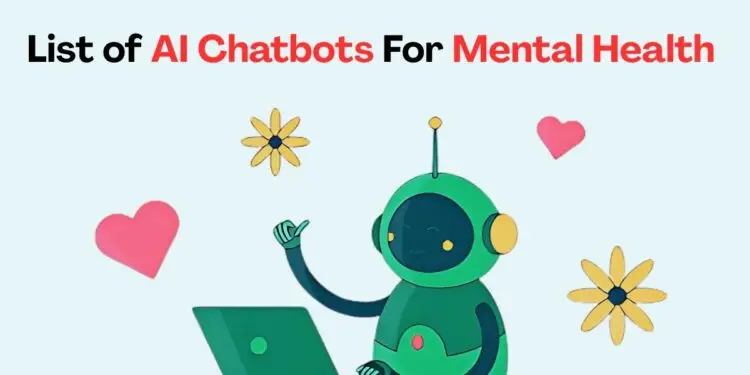Mental health is a growing concern worldwide. There are recent studies that indicate young adults, particularly those between 18 to 29, are suffering from diminishing well-being.
Research by Baylor and Harvard University concluded that youth happiness is diminishing in most regions of the world, including India. Globally, many people struggle with their mental health. Financial effects are considerable, as mental illness is estimated to cost the global economy $6 trillion per year by 2030.
Artificial Intelligence (AI) is becoming a means to help solve mental health problems. AI chatbots are capable of providing immediate, confidential, and low-cost assistance, increasing the access and availability of mental health resources.
This can make it easier for people to use mental health assistance. In countries like China and Taiwan, individuals are turning to such AI chatbots since professional assistance is unavailable or since people shy away from discussing their mental health.
Evidence demonstrates that such AI chatbots can also make others feel better when they are down. Today, we are going to examine the top 10 AI mental health chatbots that can be used in 2025.
List of Top 10 AI Chatbots For Mental Health [2025]
After testing each AI chatbot ourselves, here are the top 10 AI chatbots for mental health. We looked at their privacy policies and chose the ones that use proven methods, are easy to use, protect user data, and offer good free plans.
| Rank | Chatbot | Best For | Platforms | Pricing | Quick Take |
| 1 | Earkick | Free AI therapist and emotional companion | iOS, Webapp | Free | Voice or text — feels like a caring, data-smart friend. |
| 2 | Wysa | Guided journaling & CBT | iOS, Android | Freemium | Personalised CBT exercises with AI support. |
| 3 | Woebot | Conversational CBT support | iOS, Android | Free | Friendly chatbot for daily mental health check-ins. |
| 4 | Youper | AI-powered emotional insight | iOS, Android | Freemium | Tracks mood and offers personalised feedback. |
| 5 | Replika | Emotional support & companionship | iOS, Android | Freemium | A customisable AI friend for connection. |
| 6 | Mindspa | Self-therapy & relaxation | iOS, Android | Freemium | Combines self-help with relaxation tools. |
| 7 | Xaia | Personalised mental health coaching | iOS, Android | Freemium | Structured mental health coaching. |
| 8 | Elomia | Daily AI therapy conversations | iOS, Android | Freemium | Consistent therapeutic support. |
| 9 | Rosebud | Reflective journaling & emotional insight | iOS, Android | Freemium | Guided self-reflection through journaling. |
| 10 | Coach Marlee | Confidence & personal development | iOS, Android | Freemium | AI coaching to boost self-esteem. |
1. Earkick
- Founded: April 2021
- Founders: Dr. Herbert Bay and Karin Andrea Stephan
- Headquarters: San Francisco, USA, and Zurich, Switzerland
- Platforms: iOS, Webapp
- Pricing: Free
- Purpose: Earkick is an AI-powered mental health platform that utilises real-time biomarker analysis and a multi-modal large language model (LLM) companion to provide mental health support. It tracks mental health data through physiological markers and conversational input, adapting to individual user needs over time.
2. Wysa
- Founded: 2016
- Founders: Jo Aggarwal and Ramakant Vempati
- Headquarters: Boston, USA, and Bengaluru, India
- Platforms: iOS, Android
- Pricing: Freemium (free basic features; premium subscription available)
- User Base: Over 6 million users across more than 95 countries
- Purpose: Wysa is an AI-based chatbot that employs cognitive behavioural therapy (CBT), dialectical behaviour therapy (DBT), and mindfulness techniques to help users manage anxiety, stress, and loneliness. It offers anonymous, privacy-protected conversations and self-help tools.
3. Woebot
- Founded: 2017
- Founder: Dr. Alison Darcy
- Headquarters: San Francisco, USA
- Platforms: iOS, Android
- Pricing: Free
- User Base: Over 2 million users across 130 countries
- Purpose: Woebot is an AI-operated chatbot that provides cognitive behaviour therapy (CBT) technology to help users manage depression and anxiety. It attaches users to daily chat, mood tracking, and medical practice.
4. Youper
- Founded: 2016
- Founders: Dr. Jose Hamilton Vargas and Diego Dotta
- Headquarters: San Francisco, USA
- Platforms: iOS, Android
- Pricing: Freemium (free basic features; premium subscription available)
- User Base: Over 1 million users worldwide
- Purpose: Youper is an AI-operated emotional health accessory that uses CBT and mindfulness techniques to help users monitor and improve their emotional health. It provides mood tracking, personal insight, and conjunctive support.
5. Replika
- Founded: 2017
- Founder: Eugenia Kuyda
- Headquarters: San Francisco, USA
- Platforms: iOS, Android, Oculus Rift
- Pricing: Freemium (free basic features; premium subscription available)
- User Base: Over 30 million users as of August 2024
- Purpose: The replica is a common AI chatbot designed to provide emotional support and association. It learns from user interactions to create an individual convergent experience, which helps users to withstand loneliness and emotional challenges.
6. Mindspa
- Founded: 2019
- Founders: Dr. Manju Agrawal, J. Antony Jerald Anand, PhD, and Allan Eesmaa
- Headquarters: Tallinn, Estonia
- Platforms: iOS, Android
- Pricing: Freemium (free basic features; premium subscription available)
- Purpose: MidSPA combines self-looking tools with relaxation techniques to help users manage stress and improve mental welfare. It provides guided attention, mood tracking, and personal self-help exercises.
7. Xaia
- Founded: 2023
- Founder: Dr. Omer Liran (psychiatrist and expert in virtual medicine)
- Headquarters: Los Angeles, California
- Platforms: iOS, Android
- Pricing: Freemium (free basic features; premium subscription available)
- Purpose: Xaiaa provides personal mental health coaching through structured programs and AI-driven support. Its purpose is to help users develop sexual strategies and achieve personal development.
8. Elomia
- Founded: 2019
- Founders: Taras Pohrebniak (CEO of Elomia Health)
- Headquarters: Kharkiv, Ukraine
- Platforms: iOS, Android
- Pricing: Freemium (free basic features; premium subscription available)
- Purpose: Alamia provides daily AI therapy conversations and provides frequent therapeutic support to users dealing with anxiety, stress, and emotional challenges. Its purpose is to provide a human-like connivance experience.
9. Rosebud
- Founded: 2024
- Founders: Chrys Bader and Sean Dadashi
- Headquarters: Santa Monica, California.
- Platforms: iOS, Android
- Pricing: Freemium (free basic features; premium subscription available)
- Purpose: Rosebud reflective focuses on jernling and emotional insight, guiding users to enhance self-awareness and emotional welfare through self-discipline practice.
10. Coach Marlee
- Founded: 2015
- Founders: Michelle Duval
- Headquarters: Sydney, Australia
- Platforms: iOS, Android
- Pricing: Freemium (free basic features; premium subscription available)
- Purpose: Coach Marlee provides AI coaching with the aim of promoting self-esteem and personal development. It provides users with tools and guidance to create confidence and achieve personal goals.
Conclusion: Why Mental Health Is Getting Worse in 2025?
So many factors are contributing towards the decline of mental health: fast-paced living, social withdrawal, and nagging stress all have their effects on an individual. A cocktail of anxiety and depression is further intensified by social media and digital engagements.
Globally, the COVID-19 pandemic has also had a lasting effect on mental well-being. The lack of resources for effective mental health care, particularly in low-income regions, makes accessing help incredibly difficult. The silence surrounding mental health often stops people from getting the assistance they need.
At any time, AI chatbots provide convenient and low-cost support services, showing prowess in aiding these issues. While not meant to replace human psychiatrists, these devices are vital in reducing the barriers to professional help.
To improve mental health by 2025 and then, a combination of technology with awareness, better access, and professional care is important.

















